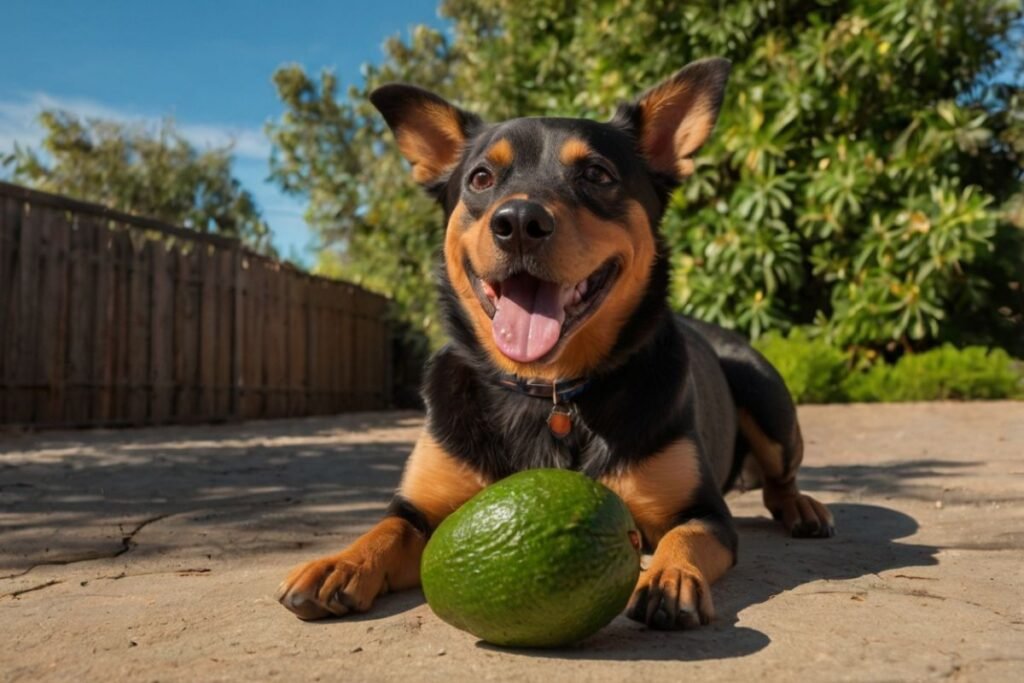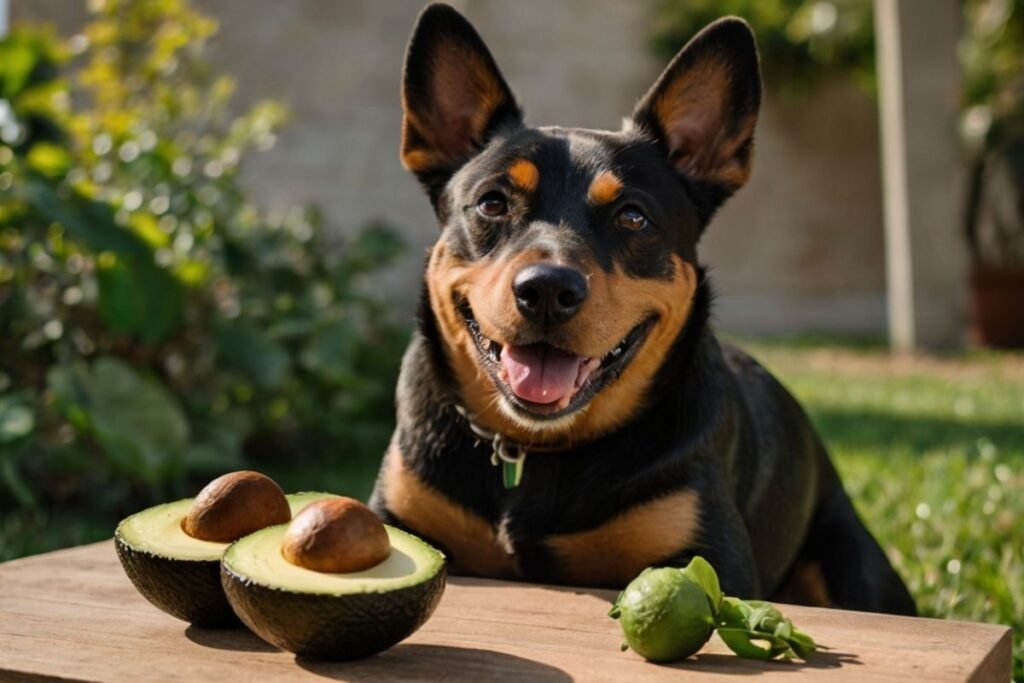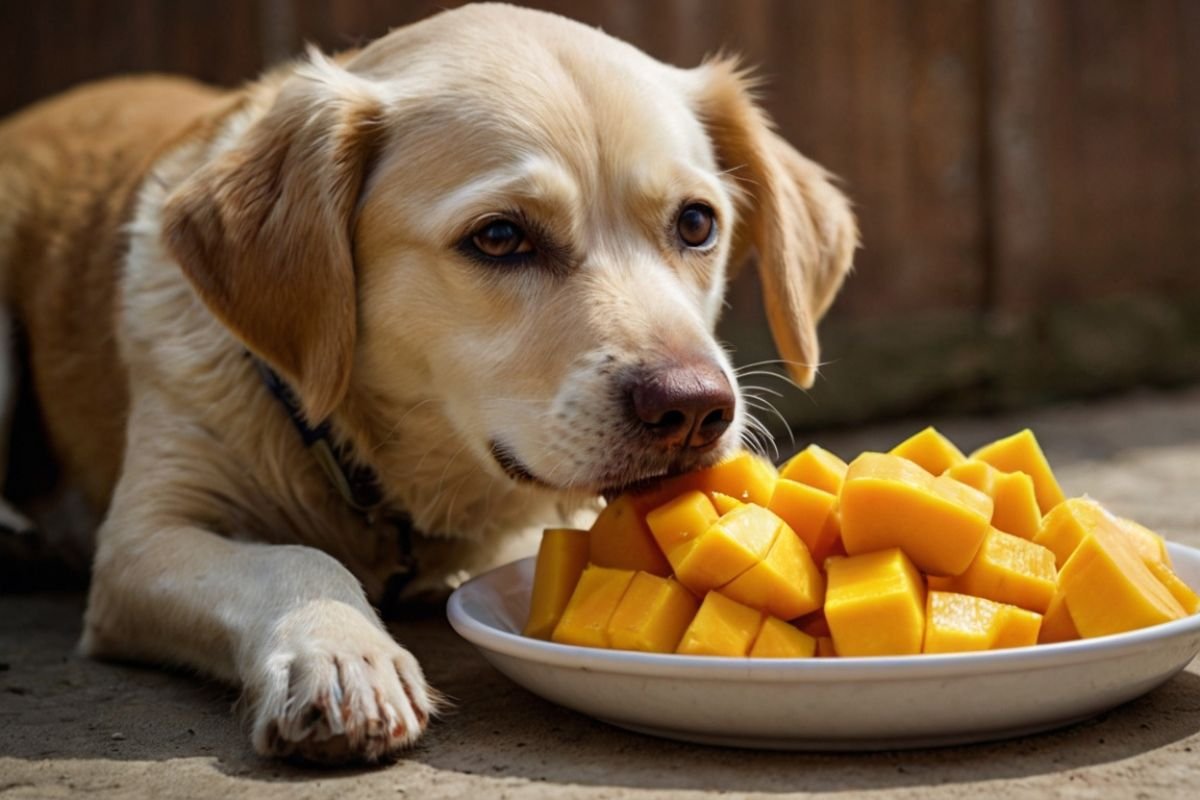You’re making your morning toast with fresh avocado. Your dog sits nearby with those adorable puppy eyes. They want a taste. But wait. Can dogs eat avocado safely?
This question worries many dog parents. After all, we love our furry friends. We want to share good food with them. However, not all human foods are safe for dogs.
Today, we’ll explore everything about dogs and avocados. You’ll learn the risks. You’ll discover safe ways to share. Most importantly, you’ll keep your dog healthy and happy.

Table of Contents
The Avocado Truth Every Dog Parent Needs
First, let’s be honest. The answer isn’t simple. Avocados can be both good and bad for dogs. This depends on several factors.
Many pet experts have mixed opinions. Some say small amounts are fine. Others warn against any avocado. Meanwhile, dog parents feel confused.
The truth lies somewhere in between. Understanding the facts helps you make smart choices. Your dog’s health depends on it.
What Makes Avocados Special?
Avocados are amazing fruits. They pack tons of nutrients. For humans, they offer incredible health benefits.
Here’s what’s inside every avocado:
Vitamins galore: Avocados contain vitamin C, E, K, and B6. They also have folate. These vitamins boost health in many ways.
Essential minerals: Magnesium and potassium are abundant. These minerals support heart function. They also help muscle health.
Healthy fats: Omega-3 fatty acids are present. These fats improve coat shine. They also support brain health.
Powerful antioxidants: Lutein and beta-carotene fight free radicals. They protect cells from damage.
Sounds great, right? However, there’s a catch for our canine friends.
Also read, Can Dogs Eat Blackberries?
The Hidden Danger: Meet Persin
Here’s where things get tricky. Avocados contain a compound called persin. This natural toxin protects the plant from fungi. Unfortunately, it can harm some animals.
Persin exists in different amounts throughout the avocado plant:
Highest levels: The leaves and bark contain the most persin. These parts are extremely dangerous for dogs.
Moderate levels: The skin and pit have significant amounts. These parts pose serious risks too.
Lowest levels: The flesh contains the least persin. This is the part we usually eat.
Interestingly, humans tolerate persin well. Dogs are also more resistant than other animals. However, large amounts can still cause problems.
How Persin Affects Your Dog
When dogs consume too much persin, several things happen. The toxin affects different body systems. Moreover, symptoms can range from mild to severe.
Digestive system: Persin irritates the stomach and intestines. This leads to upset tummies. Dogs may vomit or have diarrhea.
Respiratory system: In severe cases, breathing becomes difficult. Dogs may pant excessively. They might also have trouble getting enough air.
Cardiovascular system: The heart can be affected too. Persin may cause irregular heartbeats. In extreme cases, heart damage occurs.
Overall health: Dogs become lethargic and weak. They lose their appetite. Additionally, they seem generally unwell.
The good news? Most dogs need to eat large amounts to get sick. Small tastes of avocado flesh rarely cause problems.
Real Risks Every Dog Parent Should Know
Beyond persin, avocados pose other dangers. Let’s explore each risk carefully. Understanding these helps you protect your furry friend.
Risk #1: Tummy Troubles
Even small amounts of avocado can upset sensitive stomachs. Dogs with delicate digestive systems are especially vulnerable. Furthermore, puppies and senior dogs face higher risks.
Common digestive symptoms include:
- Mild vomiting
- Loose stools
- Stomach discomfort
- Loss of appetite
- Excessive drooling
These symptoms usually appear within hours. Most dogs recover quickly with care. However, persistent symptoms need veterinary attention.
Risk #2: The Fat Factor
Avocados are high in fat. While these are healthy fats for humans, dogs process fats differently. Too much fat can trigger pancreatitis.
Pancreatitis is serious. The pancreas becomes inflamed and painful. Dogs with this condition need immediate veterinary care.
Signs of pancreatitis include:
- Severe vomiting
- Intense abdominal pain
- Lethargy and weakness
- Loss of appetite
- Fever
- Dehydration
Certain dogs face higher risks. Overweight dogs are more vulnerable. Similarly, dogs with previous pancreatitis episodes should avoid high-fat foods completely.
Risk #3: Choking Hazards
The avocado pit is dangerous. It’s large and hard. Dogs who swallow pits face serious risks.
Immediate choking: The pit can block the airway. This is a life-threatening emergency. Quick action saves lives.
Intestinal blockage: If swallowed, pits can block intestines. This prevents food from passing through. Surgery is often needed to remove the obstruction.
Tooth damage: Some dogs try to chew pits. The hard surface can crack or break teeth. Dental repairs are expensive and painful.
Never leave avocado pits where dogs can reach them. Always dispose of them safely.
Risk #4: Skin and Leaves Danger
The avocado skin contains more persin than the flesh. Dogs who eat skin face higher toxicity risks. Additionally, leaves from avocado trees are extremely dangerous.
If your dog eats skin or leaves, watch for:
- Persistent vomiting
- Severe diarrhea
- Difficulty breathing
- Unusual lethargy
- Loss of coordination
These symptoms require immediate veterinary attention. Don’t wait to see if they improve.
Safe Ways to Share Avocado (If You Choose To)

Some dog parents still want to share avocado with their pets. If you decide to do this, follow strict safety rules. Your dog’s wellbeing depends on careful preparation.
Rule #1: Flesh Only
Only offer the inner flesh. Remove all skin completely. Also, never give the pit. Furthermore, avoid any brown or dark spots.
The flesh should be fresh and ripe. Overripe avocado can harbor harmful bacteria. Similarly, unripe flesh is harder to digest.
Rule #2: Tiny Portions
Start with a pea-sized amount. Watch your dog carefully for 24 hours. Look for any signs of digestive upset.
If your dog tolerates it well, you can occasionally offer small amounts. However, never make it a regular treat. Once or twice per month is plenty.
Rule #3: Preparation Matters
Mash the flesh thoroughly. This makes it easier to digest. Additionally, remove any stringy parts.
Never add salt, pepper, or other seasonings. These ingredients can harm dogs. Plain, fresh avocado flesh is safest.
Rule #4: Know Your Dog
Some dogs should never eat avocado. This includes:
- Dogs with sensitive stomachs
- Overweight or obese dogs
- Dogs with previous pancreatitis
- Puppies under six months
- Senior dogs with health issues
When in doubt, skip the avocado. Your dog’s health is more important than sharing food.
Commercial Dog Foods with Avocado
Surprisingly, some dog foods contain avocado ingredients. These products use processed avocado oil or meal. The processing reduces persin content significantly.
Avocado oil: This provides healthy fats without much persin. It supports coat health and skin condition. Many premium dog foods include this ingredient.
Avocado meal: This is made from dried avocado flesh. The drying process reduces persin levels. It adds fiber and nutrients to dog food.
These commercial products undergo safety testing. They’re generally safer than fresh avocados. However, always choose reputable brands with good safety records.
Better Alternatives for Your Dog
Instead of avocado, consider these safe, healthy treats. Your dog will love them just as much. Plus, you won’t worry about risks.
Crunchy Vegetables
Carrots: These orange veggies are perfect for dogs. They’re low in calories and high in fiber. Additionally, they help clean teeth naturally.
Green beans: Fresh or frozen green beans make great treats. They’re filling but low in calories. Dogs love the satisfying crunch.
Broccoli: Small amounts of broccoli are healthy. It provides vitamins and antioxidants. However, too much can cause gas.
Sweet Fruits
Blueberries: These tiny fruits pack huge nutrition. They’re full of antioxidants and vitamins. Most dogs love their sweet taste.
Apple slices: Remove seeds and core first. Apples provide vitamins A and C. They also offer satisfying crunch and natural sweetness.
Watermelon: This summer fruit is mostly water. It’s refreshing and hydrating. Remove seeds before serving.
Digestive Helpers
Pumpkin: Plain, cooked pumpkin aids digestion. It’s especially helpful for dogs with tummy troubles. Choose pure pumpkin, not pie filling.
Sweet potato: Cooked sweet potato provides fiber and vitamins. It’s naturally sweet and filling. Many dogs prefer it over regular potatoes.
These alternatives provide nutrition without risks. They’re safer choices for regular treats.
What to Do If Your Dog Eats Avocado
Accidents happen. Despite our best efforts, dogs sometimes grab forbidden foods. If your dog eats an avocado, stay calm but act quickly.
Small Amount of Flesh
If your dog eats a small piece of avocado flesh, don’t panic. Monitor them closely for the next 24 hours. Look for signs of digestive upset.
Provide fresh water. Keep them comfortable. Most dogs handle small amounts without problems.
Call your vet if you notice:
- Repeated vomiting
- Severe diarrhea
- Extreme lethargy
- Loss of appetite lasting more than 12 hours
Skin, Pit, or Large Amounts
This is more serious. Contact your veterinarian immediately. Don’t wait for symptoms to appear.
Be ready to provide information:
- How much did they eat?
- What parts of the avocado?
- When did it happen?
- What’s your dog’s weight?
Your vet may recommend:
- Inducing vomiting
- Bringing your dog in for examination
- Monitoring at home with specific instructions
- Emergency treatment if needed
Time matters in these situations. Quick action prevents complications.
Signs Your Dog Needs Emergency Care
Some symptoms require immediate veterinary attention. Don’t wait or try home remedies. These signs indicate serious problems:
Breathing difficulties: Rapid or labored breathing needs urgent care. Persin toxicity can affect the respiratory system.
Severe vomiting: Non-stop vomiting leads to dehydration quickly. This is especially dangerous for small dogs.
Extreme lethargy: If your normally active dog becomes completely listless, seek help immediately.
Signs of choking: Pawing at the mouth, gagging, or inability to swallow requires emergency intervention.
Abdominal pain: Dogs showing severe belly pain need immediate attention. They may arch their back or refuse to move.
Trust your instincts. You know your dog best. If something seems seriously wrong, don’t hesitate to seek professional help.
Prevention is the Best Medicine
The easiest way to keep your dog safe is prevention. Create an avocado-safe environment in your home.
Kitchen safety: Keep avocados in closed containers or high shelves. Don’t leave cut avocados on counters where dogs can reach them.
Disposal methods: Wrap avocado scraps in paper before throwing them away. Use a covered trash can. Dogs love to explore garbage.
Family education: Teach everyone in your household about avocado dangers. Children especially need to understand the rules.
Garden awareness: If you have avocado trees, prevent access to fallen fruit and leaves. Consider fencing around trees if necessary.
The Bottom Line for Dog Parents
So, can dogs eat avocado? The answer is complicated. Small amounts of flesh might be okay for some dogs. However, the risks often outweigh the benefits.
Consider these key points:
- Avocados contain persin, which can be toxic to dogs
- The flesh has the lowest persin levels but still poses risks
- Skin, pit, and leaves are extremely dangerous
- Some dogs are more sensitive than others
- Many safer alternatives exist
As a loving dog parent, your pet’s safety comes first. When in doubt, choose alternatives that don’t carry these risks.
Making the Right Choice for Your Furry Friend
Every dog is different. Some might handle tiny amounts of avocado flesh without problems. Others could get sick from the smallest taste.
Consider your dog’s individual factors:
- Age and size
- Overall health status
- Previous food sensitivities
- Current diet and weight
Most veterinarians recommend avoiding avocado altogether. The potential risks simply aren’t worth it when safer options exist.
Your Dog’s Health Journey Continues
Caring for your dog means making countless daily decisions. Food choices are just one part of keeping them healthy and happy.
Focus on providing:
- High-quality dog food appropriate for their age and size
- Fresh water always available
- Safe, healthy treats in moderation
- Regular veterinary checkups
- Plenty of love and attention
Remember, you’re doing great as a dog parent. Asking questions about food safety shows how much you care. Your dog is lucky to have someone who puts their wellbeing first.
When it comes to avocado and dogs, the safest choice is usually to skip it entirely. Your furry friend will be just as happy with safer alternatives. After all, their health and your peace of mind are worth more than any single treat.
Choose wisely. Love deeply. Keep your precious pup safe and healthy for years to come.

Shahriar Robin is the creator of WhatPetsCanEat.com, a passionate pet lover and dedicated cat dad to Rio, a curious two-year-old orange feline who inspired this website. With a love for animals and a knack for research, Shahriar shares trusted, easy-to-understand information to help fellow pet owners make safe, healthy food choices for their furry friends.


